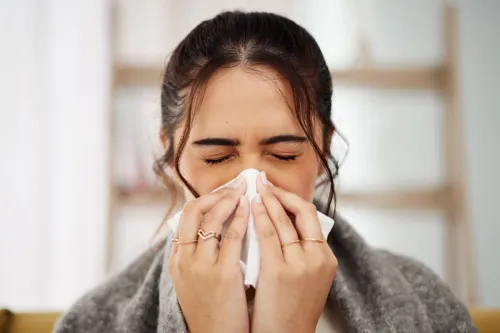15 Foolproof Ways to Boost Your Immune System

Whether it’s a mild case of the sniffles, a 24-hour stomach bug, or something more serious, being sick is no fun. But the best defense, as they say, is a good offense—and when it comes to your health, your immune system is your first-string team. Boosting it can help you stay well in every season as viruses come and go around you.
The Centers for Disease Control and Prevention (CDC) lists six things that will help keep your immune system working at its best: eating well, staying active, maintaining a healthy weight, getting adequate sleep, avoiding alcohol, and refraining from tobacco use.
But for a few more specific tips, Best Life reached out to doctors and asked about their favorite ways to boost immunity. Read on to find out what they recommend to help you feel your best year-round.
RELATED: I’m a Nutritionist and Here’s Exactly What I Do to Not Get Sick.
What does your immune system do?

Your immune system is a “complex network of cells, tissues, and organs,” according to the National Library of Medicine’s (NLM) MedlinePlus. Together, this network works to defend your body “against substances it sees as harmful or foreign.” Known as antigens, these substances can include things like bacteria, viruses, chemicals, and toxins.
“Our immune system serves a remarkable number of functions,” Daniel Landau, MD, oncologist, hematologist, and contributor for The Mesothelioma Center, tells Best Life. “While most people think about the immune system’s role in battling colds and flus, its functions also include preventing and treating cancers.”
Why should you consider giving it a boost?

Having a strong immune system is “critical for combating infections, viruses, and diseases,” according to Paul Daidone, MD, pain management physician and medical director at True Self Recovery.
He explains, “It promotes quicker recovery and reduces the severity of illnesses, thereby improving overall health and longevity.”
If your immune system is weak, on the other hand, “you’re more likely to get sick and take longer to recover,” notes Steve Gendron, PhD, biomedical researcher and founder of Mindful Living Choice.
But how do you know if you need to strengthen your immune system? According to Gendron, you may experience frequent colds and infections, slow healing, fatigue, and digestive issues when your immune system is on the weaker side.
“Keeping your immunity strong means you can fend off potential threats effectively,” he says.
Keep reading to find out about 15 different ways you can boost your immune system.
RELATED: Should You Drink Coffee When You’re Sick? Doctors Weigh In.
1
Focus on the quality of your sleep.

If you’re in bed for eight hours but scrolling on your phone for two of them, you’re not doing your immune system any good.
“Your body needs adequate rest to function properly. Sleep disturbance and deprivation can lead to higher levels of cortisol, which can suppress your immune function,” Lucky Sekhon, MD, double board-certified OBGYN at RMA of New York, says. “Studies have shown getting less than seven hours of shut-eye per night is associated with a higher risk of coming down with viral illnesses.”
RELATED: 6 Bedtime Habits of People Who Never Get Sick.
2
Keep your home nice and bright.

To keep your immune system functioning at its best, Niket Sonpal, MD, an internist and gastroenterologist in New York City, recommends letting as much sunshine into your home as possible during the day.
“Take measures to brighten up rooms in your home. If you have a balcony or backyard, utilize it to get sun during the day so your body can continue a semi-synced schedule with the sun,” he advises. “Then at nighttime, dim the lights, reduce your news intake for the evening, and practice self-care in order to clear your mind.”
3
Go outside to get some sun.

While letting the sunlight into your home is important, it’s also beneficial to catch those rays outside. “Get outdoors when the sun is shining,” E. Gaylon McCollough, MD, plastic surgeon and founder of McCollough Plastic Surgery Clinic in Gulf Shores, Alabama, says. “Sunlight allows your skin to produce vitamin D, which supports your immune system.”
Cleveland Clinic recommends aiming for 10 to 15 minutes of sun exposure two to three times a week on your face, arms, or back.
4
Get up and go for a walk.

Your immune system functions best when you make an effort to up your daily activity. That means taking walks and getting up at least once an hour—basically, moving in any way you can.
“Staying active is a powerful way to boost the health of your immune system. It lowers the levels of stress hormones such as cortisol,” Sekhon says. “Exercise has been shown to promote more rapid and efficient circulation of immune cells, such as white blood cells, theoretically making it easier [and] faster for your immune system to detect invading bacteria or viruses.”
RELATED: The Best Times of Day to Walk for Your Health, Experts Say.
5
Exercise on a regular basis.

Besides taking walks, it’s also helpful to your immune system to put an exercise program in place. “Exercise enhances the immune system,” physician, wellness coach, and holistic practitioner Eudene Harry, MD, confirms.
“Researchers found that not only did exercise increase immunity up to 10 times immediately after exercise but, in the hours following exercise, the immune cells seem to be sent to areas of the body that are more likely to get infected. Talk about intelligent design—something that we can easily do every day can help us boost our immunity,” she says.
6
Eat a Mediterranean-style diet.

One of the best ways to boost your immune system is through the food you eat—and experts say adopting a Mediterranean-style diet is the way to go.
According to Sekhon, much of our immune function is influenced by our gut health.
“Eating a diet rich in healthy fats—think avocado, fatty fish, and olive oil—fruits, vegetables, whole grains, and nuts—will help reduce inflammation and fight off infection due to being high in vitamins, antioxidants, and key elements such as zinc,” she explains.
RELATED: 8 Best Mediterranean Diet Foods to Eat for Weight Loss, Dietitians Say.
7
Prioritize vitamin-rich foods.

Harry says that when it comes to your immune system, it’s important to pay close attention to what’s in the food on your plate as well.
“Certain nutrients—such as zinc, vitamin C, selenium, vitamin A, and proteins—have been shown to support the immune system,” she explains. “There are also studies that show excessive amounts of nutrients can impair the immune system. The best way to assure balance is with diet. Think hummus and carrots as snacks, and chicken vegetable soups or lentil soup.”
8
Make sure you stay hydrated.

What you drink every day is just as important as what you eat—so make sure you’re getting enough water, too, if you want your immune system to be in tip-top shape.
“Staying hydrated helps your organs and systems, including the immune system, function properly. Water promotes the production of lymph, which transports white blood cells and other immune system cells,” Daidone explains.
To help keep your immunity intake, Varsha Khatri, RDN, registered nutritionist and nutritional therapist, recommends drinking at least eight glasses of water daily.
“You might also want to add hydrating foods like cucumbers, oranges, or watermelons to your diet for better hydration and better support for the body’s immunity,” she suggests.
9
Minimize your sugar intake.

It’s also a good idea to learn about what you shouldn’t eat—and while it may be tempting to snack on every sweet treat in sight, all that sugar isn’t doing your immune system any good. McCollough says refined sugars interfere with your body’s ability to fight off offending agents and organisms, so it’s best to minimize your sugar intake.
10
Avoid overly processed foods.

At the same time, filling your diet with highly processed foods can prevent your immune system from doing what it’s supposed to do as well.
“It’s very easy and tempting to stock your home with low-nutrient foods, such as chips and sweets, but these foods will leave you lacking in the nutrition you need to keep yourself healthy and strong,” internal medicine physician Erika S. Krauss, DO, says. “Instead, look for frozen veggies and fruit, lean meat that you can freeze for later, and legumes such as beans and nuts.”
RELATED: Longevity Expert Says Avoid Eating the “Poisonous 5 Ps” If You Want to Live to 100.
11
Take supplements as needed.

Most of what you need to lead a healthy lifestyle with an optimized immune system can be consumed through your diet, according to Sonpal.
But if you can’t get everything you need from the food you’re eating, you can always try getting it through other means.
“Consult your doctor about any nutritional deficiencies you may have where supplements can step in,” Sonpal recommends.
RELATED: 4 Best Anti-Inflammatory Supplements, Doctors Say.
12
Brush your teeth.

If you’re interested in boosting your immune system, Jerry Friedman, DDS, oral surgeon with North Jersey Oral & Maxillofacial Surgery, says you should look no further than your toothbrush.
“Brushing your teeth daily helps remove harmful bacteria from your mouth, reducing your risk of oral infections,” he explains. “There is also some evidence to suggest that good oral hygiene can help promote a healthy gut microbiome, which improves your overall health and, in turn, can support your immune system.”
13
Practice regular hand washing.

Don’t skip out on going to the sink if you’re worried about your immune system. “Regular hand washing is a simple yet effective way to stop infections from spreading and lessen the load on your immune system by preventing pathogens before they enter the body,” Daidone notes.
14
Connect with friends and family.

Something as simple as connecting with your loved ones can keep you healthy as well. After all, your immune health is “positively influenced by friendships and productive social interactions,” according to Khatri.
“Some research reveals that having strong social bonds can have higher immunoglobulin levels which have a key role in the immune system,” she explains. “This shows that people can boost their immunity by keeping social connections.”
Gendron adds that social connections can also reduce stress hormones like cortisol, which may boost the immune system.
“Make sure you hang out with friends and family, whether it’s in person, over the phone, or through video calls,” he says. “And consider joining clubs or groups to meet new people and build a supportive network.”
15
Be mindful of your mental health.

It’s crucial to keep your mental health in check as “chronic stress is like kryptonite for your immune system,” according to Gendron.
Gendron recommends practicing mindfulness, meditation, and deep breathing to keep cortisol levels down and boost immune health. These practices can all positively manage stress.
“Take a few minutes each day for mindfulness or meditation—apps like Headspace or Calm can guide you,” he says. “But even simple deep breathing exercises can make a big difference.”